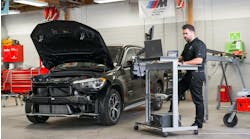Jan. 12, 2017—The Environmental Protection Agency (EPA) accused Fiat Chrysler (FCA) of using software that allowed some of its diesel trucks to cheat on emissions tests, according to a report from the Washington Post.
The vehicles involved were the 2014-2016 model year Dodge Ram 1500 pickup trucks and Jeep Grand Cherokees with 3.0-liter diesel engines. The EPA’s allegations affect roughly 104,000 vehicles, noted the report.
The software allowed the vehicles to emit more nitrogen oxide than is allowed under the Clean Air Act, officials said. The alleged technology was discovered when the EPA launched an expansion on its vehicle testing practices after comparable technology was found in 2015, in select diesel engine Volkswagen models.
The FCA issued a statement following the EPA’s accusations:
FCA US diesel engines are equipped with state-of-the-art emission control systems hardware, including selective catalytic reduction (SCR). Every auto manufacturer must employ various strategies to control tailpipe emissions in order to balance EPA’s regulatory requirements for low nitrogen oxide (NOx) emissions and requirements for engine durability and performance, safety and fuel efficiency. FCA US has spent months providing voluminous information in response to requests from EPA and other governmental authorities and has sought to explain its emissions control technology to EPA representatives. FCA US has proposed a number of actions to address EPA’s concerns, including developing extensive software changes to our emissions control strategies that could be implemented in these vehicles immediately to further improve emissions performance.
The automaker said it believes that its emission control systems, comparable to its competitors, meet the necessary requirements for diesel engine vehicles. They will continue to work with the EPA to address these issues.
If the accusations are proven true, FCA would be the second automaker to have implemented devices or systems to “cheat” emissions testing.
“Failing to disclose software that affects emissions in a vehicle’s engine is a serious violation of the law, which can result in harmful pollution in the air we breathe,” said Cynthia Giles, assistant administrator for EPA’s Office of Enforcement and Compliance Assurance, in a statement issued by the government agency. “All automakers must play by the same rules, and we will continue to hold companies accountable that gain an unfair and illegal competitive advantage.”


